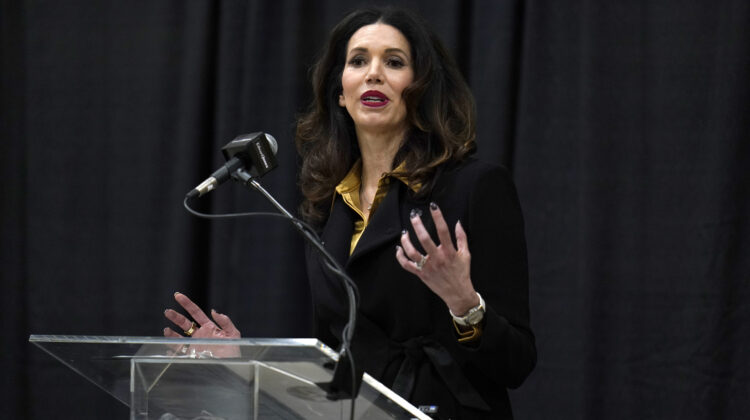One month after Arizona surprised the college sports world by firing athletic director Dave Heeke, the Wildcats produced another plot twist.
The appointment of Missouri’s Desiree Reed-Francois as Heeke’s replacement on Monday was a multi-level whopper with loads of unanswered questions.
How were the Big 12-bound Wildcats able to lure away an athletic director from the mighty SEC?
Why would Reed-Francois accept a pay cut to leave a prosperous, stable athletic program for a school swallowed whole by financial calamity?
If nothing else, it’s a terrible look for Missouri in the same way UCLA coach Chip Kelly’s departure, to become Ohio State’s offensive coordinator, was a bad look for the Bruins.
We might gain a morsel of clarity in coming days — Reed-Francois’ tenure officially begins March 3 — but some answers could remain forever concealed from public view.
There’s no disputing one aspect, however: The Wildcats could not have asked for a better outcome to their search, which began Jan. 22 following Heeke’s abrupt dismissal.
At the time, the Wildcats were emerging from a coaching transition. They had lost Jedd Fisch to Washington and hired Brent Brennan from San Jose State, and they were desperate to keep their roster intact as players pondered the transfer portal.
Rare is the school that changes athletic directors during such a critical period. The move seemed to substantiate the industry belief that Arizona president Robert Robbins is the de facto athletic director and left many, including the Hotline, skeptical that he could lure an established leader given the department’s fiscal uncertainty.
Just 28 days later, Robbins made what one industry source described as a “home run” hire.
Reed-Francois is something else, too: She’s the only name in the overlapping region of the Wildcats’ complicated Venn diagram.
How so?
Regardless of the exact dollar figure — whether it’s $20 million or $30 million or whatever — the athletic department’s budget shortfall is substantial. Robbins told the faculty a few months ago that sports could be eliminated. Clearly, major structural changes are needed to place Arizona on stable ground and give its sports a chance to thrive next season (and beyond) in the Big 12.
No decision is more difficult for an athletic director than whether to cut sports, and the prospect very well could have scared off candidates. Few projects are more complex than overhauling a department’s economic model.
Reed-Francois is as qualified to make those decisions — not alone, of course, but alongside Robbins — as anyone the Wildcats could have hired, for she fills the essential middle of the Venn diagram:
— Circle No. 1: Experienced major college athletic directors willing to accept Arizona’s offer.
Reed-Francois, who will be the only female athletic director in the Big 12, reportedly experienced pushback from Missouri’s governing board. The St. Louis Post-Dispatch noted “low-key friction” between the board and Reed-Francois, along with increased “oversight” of athletics.
It’s a curious turn of events given her success hauling Missouri’s budget out of the red and into the black, her engagement with the community and her oversight of a thriving football program.
Prior to Missouri, Reed-Francois spent four years at UNLV, where money is tight. Also, she excels at external relations, a critical trait given Arizona’s desperate need to rebuild relationships with several top donors.
“She’s really smart, has a great presence and really good experience,” the source said. “I think they hit a home run.”
— Circle No. 2: Proven athletic administrators with ties to Arizona itself (or Tucson).
Reed-Francois grew up in the Bay Area and attended UCLA but received her law degree from Arizona.
Tucson isn’t exactly home. But as with Brennan, who worked for former Arizona coach Dick Tomey, it’s familiar, meaningful terrain. She knows the culture and understands what the university means to the community.
The fit, so crucial for both athletic directors and head coaches, is right.
— Circle No. 3: Former college athletes.
Reed-Francois was a rower at UCLA, inspired to the endeavor via a correspondence with John Wooden — she still has the letters — and that equips her with crucial empathy for the decisions on eliminating sports and changing the scope of athletics.
If the overlapping region of those circles featured a name other than Reed-Francois, we are unaware.
Arizona’s success in the Big 12 requires a strategy that produces more efficient athletic operations, taps into the community for NIL support and positions Arizona for the next era of college sports.
Revenue sharing with athletes is inevitable.
Another round of conference consolidation is coming.
The NCAA’s model of amateurism is on the brink of collapse.
Because of the financial crisis, Arizona has more systemic pressures and additional strategic complications. There are precious few athletic directors with the right skill set for the daunting task ahead.
The Wildcats found one.
“Optically, the hire is a massive win at a time of significant tension for Arizona,” a second source said.
“If (Reed-Francois) didn’t have a previous connection to the university, you’d wonder what she’s running from (at Missouri). But I think she understands the potential Arizona has in the expanded Big 12.”
*** Send suggestions, comments and tips (confidentiality guaranteed) to pac12hotline@bayareanewsgroup.
*** Follow me on Twitter: @WilnerHotline
*** Pac-12 Hotline is not endorsed or sponsored by the Pac-12 Conference, and the views expressed herein do not necessarily reflect the views of the Conference.
Related posts:
 Wilner Hotline: Upcoming Pac-12 Head Football Coaching Vacancies
Wilner Hotline: Upcoming Pac-12 Head Football Coaching Vacancies 
Arizona guard Kerr Kriisa (25) (AP Photo/Rick Scuteri)
Wilner Hotline – Week One Pac-12 Basketball Power Ratings Pac-12 Hoops Power Ratings – Arizona, UCLA, USC at the Top
Pac-12 Hoops Power Ratings – Arizona, UCLA, USC at the Top  Mailbag: Arizona’s financial crisis, impact of the House case, ‘Pac-2’ legal affairs, UW’s perfect run, Taylor’s good work and more
Mailbag: Arizona’s financial crisis, impact of the House case, ‘Pac-2’ legal affairs, UW’s perfect run, Taylor’s good work and more
